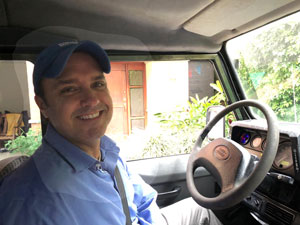 This article was written based on an interview with Óscar Grajales, a Special Agent with United States Department of State, Diplomatic Security Service. Agent Grajales was interviewed from San Jose, Costa Rica. He is the Assistant Regional Security Officer for Investigations in the Office of Criminal Investigations at the US Embassy in San Jose, Costa Rica.
This article was written based on an interview with Óscar Grajales, a Special Agent with United States Department of State, Diplomatic Security Service. Agent Grajales was interviewed from San Jose, Costa Rica. He is the Assistant Regional Security Officer for Investigations in the Office of Criminal Investigations at the US Embassy in San Jose, Costa Rica.
I have always wanted to be in law enforcement. It was just always sort of in me. I wanted to be a peace officer or something with law enforcement. I was living in Washington, DC, I was in law school and I did not like it. My parents really wanted me to go to law school. And so after my first semester, I was like, “You know what? I need to take a break. This law school thing isn’t for me, but I’ve always wanted to be a police officer.”
So I applied to be a police officer with the Metropolitan Police Department, and I became an officer with MPD in Washington, D.C. and was there for roughly three years. I met my wife and we decided to move to Burlington, Vermont. I then became a police officer in Burlington and was there for also about three years. I’ve always wanted to do something in law enforcement, and, I like to move around and I like to do different things. I’ve always known that the State Department has this great law enforcement agency, Diplomatic Security Service, and you do so many different cool things.
Mission of the Department of State, Diplomatic Security Service
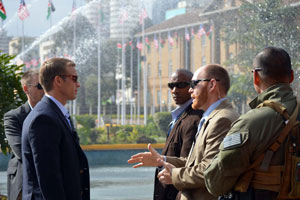 You move around all over the world and you have different tasks and different jobs all throughout your career. So for me, joining the Diplomatic Security Service fit me like a glove. I get to do law enforcement on an international level, and travel, and be all over the place. The mission of Diplomatic Security is to ensure a safe and secure environment for the conduct of US diplomacy. And, we do a lot of criminal investigations, visa and passport fraud investigations worldwide. We do a lot of human smuggling, human trafficking types of investigations as well.
You move around all over the world and you have different tasks and different jobs all throughout your career. So for me, joining the Diplomatic Security Service fit me like a glove. I get to do law enforcement on an international level, and travel, and be all over the place. The mission of Diplomatic Security is to ensure a safe and secure environment for the conduct of US diplomacy. And, we do a lot of criminal investigations, visa and passport fraud investigations worldwide. We do a lot of human smuggling, human trafficking types of investigations as well.
Diplomatic Security has the largest global reach of any other US law enforcement organization. We are all over the world, in roughly 170 countries, 270-ish US Embassies and Consulates. We’re in 33 US cities as well. We do protection. We protect the Secretary of State. We protect dignitaries from abroad that are in in the United States. We do all of the security for the embassies, the people, the information. Our breadth of responsibility is enormous.
I’ve worked in lots and lots of countries. I’ve done short-term temporary duty assignments in China, Somalia. My family and I have lived several years in India, several years in Kenya. I’ll be three years in Costa Rica. We also lived in New York City, New Orleans, and Washington, D.C..
My family loves the opportunity to live in different places. My children have actually never lived anywhere for more than two years. Every time you move, you get a new assignment, a new job, and that fits us perfectly well. Every two to three years, depending on your assignment, even sometimes it’s one year if it’s a high threat post, you have to bid on your next position and it can be any anywhere in the world, including the United States, where there’s a position open for a special agent.
Abducting Americans in Kenya
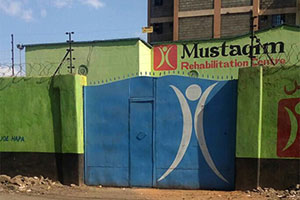 I was at the US Embassy in Nairobi, Kenya, and in Kenya there are government licensed re-acculturation facilities that are set up to teach culture to Somalis or the Somali diaspora whose families believe that they may have lost touch with Somali tradition while living abroad, because a lot of Somali’s have left Somalia because of what’s happening in the country.
I was at the US Embassy in Nairobi, Kenya, and in Kenya there are government licensed re-acculturation facilities that are set up to teach culture to Somalis or the Somali diaspora whose families believe that they may have lost touch with Somali tradition while living abroad, because a lot of Somali’s have left Somalia because of what’s happening in the country.
There are these re-acculturation centers that say, “If you are part of the Somali diaspora, you can come here and we can help you, bring you back to your roots.” There are also unlicensed facilities in Nairobi, Kenya. These unlicensed facilities will oftentimes collaborate with family members to deceive other relatives into traveling to Kenya from the United States or from Europe or from other nations.
Unlicensed Facilities run by Criminal Syndicates
These unlicensed facilities have bad reputations and are basically criminal syndicates. They will abduct some of the younger Somali folks upon their arrival. The victims that are in these unlicensed facilities can come from anywhere in the world. When we first started working this, we realized that the victims in these unlicensed facilities were coming from the United States, from the UK, Canada, Tanzania, Norway, Australia, Somalia itself, and Kenya.
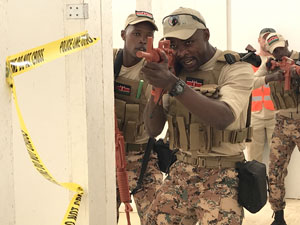 It was not just a US problem, but an issue affecting counties all over. Basically what would happen is when there was a first generation American of Somali decent that has lived in the United States for most if not all of their life, their family may feel that they have lost touch with their Somali heritage and culture. Their family would say, “Nana is sick. Why don’t we go back to Kenya so you can see Nana and we’ll pay for your flight to go over there.”
It was not just a US problem, but an issue affecting counties all over. Basically what would happen is when there was a first generation American of Somali decent that has lived in the United States for most if not all of their life, their family may feel that they have lost touch with their Somali heritage and culture. Their family would say, “Nana is sick. Why don’t we go back to Kenya so you can see Nana and we’ll pay for your flight to go over there.”
So this person, normally in their late teens or early twenties, would fly over to Kenya to see Nana and then they would be picked off the street by people from these unlicensed facilities, they would be abducted. Some of these abducted people would be kept there against their will for a few weeks. I even interviewed somebody that who’d been there for over a year. It was a very terrible problem.
The Start of the Investigation
The way that I got into this investigation was that some of the victims of these unlicensed re-acculturation facilities were from the United States, they were American. One day I was at the embassy in Kenya and this young man comes to the embassy and says, “Hey, I’ve been kidnapped and I’ve been beaten. And all of these horrible things have happened to me in this part of town. I was able to escape. Please help me.” So we did.
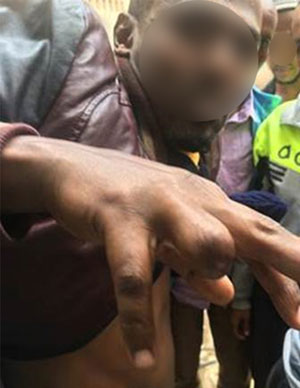 We got him back to the United States as quickly as we could. We started involving Kenyan law enforcement. We started involving the front office. A couple of months later, we got somebody else who came to the embassy and filed a complaint that something similar had happened to him. And then roughly around the same time, American Citizens Services at the embassy received an email from somebody who had stolen a phone from the inside of one of these re-acculturation facilities, and basically said, “Help me.” So we decided, because this was becoming very exigent, this wasn’t something that could wait. We worked with our Kenyan law enforcement partners, the US Consular, American Citizens Services, the Regional Security Office, the front office, everybody was working to find out what was happening. A raid was organized. The raid was conducted by law enforcement of the Kenyan government. We can’t actually do those raids, but we did assist in the preparation.
We got him back to the United States as quickly as we could. We started involving Kenyan law enforcement. We started involving the front office. A couple of months later, we got somebody else who came to the embassy and filed a complaint that something similar had happened to him. And then roughly around the same time, American Citizens Services at the embassy received an email from somebody who had stolen a phone from the inside of one of these re-acculturation facilities, and basically said, “Help me.” So we decided, because this was becoming very exigent, this wasn’t something that could wait. We worked with our Kenyan law enforcement partners, the US Consular, American Citizens Services, the Regional Security Office, the front office, everybody was working to find out what was happening. A raid was organized. The raid was conducted by law enforcement of the Kenyan government. We can’t actually do those raids, but we did assist in the preparation.
Results of the Raid
When the Kenyan police went in, there were roughly 40 to 50 individuals, all captive in horrible conditions, horrible conditions. Many of them were chained to the walls and had been chained for weeks, months. The police officer told me, he said, “We walked into this one room and there was still blood all over the wall.” There were chains, there were whips. It was a torture place. It was heartbreaking. I met the victims. Our team met the victims. We had a lot of security personnel, and the Consular was there to assist our Americans in need. There were other embassies from other countries because we found victims who were from other countries. So they sent representatives to be able to assist their own citizens. I remember being at the police station and starting to interview many of these victims. There were a few of them that were missing digits, fingers, as punishment for whatever thing that they did while they were in captivity, they removed fingers. One was very fresh.
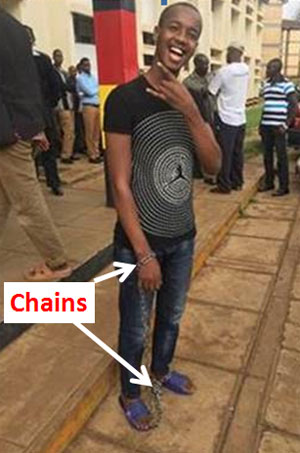 I remember speaking to one of the Kenyan police officers afterwards, and he was shaking his head and he said, “I cannot believe this is happening in my country.” I recall interviewing somebody who had taken a hatchet, or something, to the head. His eyes were still red. He was still stitched up. It was just terrible. But what was really disheartening about it was there were people there who were still in chains. They were literally still in chains. I have photos of it for the case, and they were so happy. They were so happy to get out. That was happening, not just in one center, but in several centers.
I remember speaking to one of the Kenyan police officers afterwards, and he was shaking his head and he said, “I cannot believe this is happening in my country.” I recall interviewing somebody who had taken a hatchet, or something, to the head. His eyes were still red. He was still stitched up. It was just terrible. But what was really disheartening about it was there were people there who were still in chains. They were literally still in chains. I have photos of it for the case, and they were so happy. They were so happy to get out. That was happening, not just in one center, but in several centers.
We started investigating several different unlicensed centers around Nairobi. The government of Kenya was raiding a lot of these places and freeing so many people, hundreds of people while I was there. And then when I left, because we were rotating out, the person who took over from my position also built great relationships also with the Kenyan government and continued with this investigation and working to rescue these people that have been abducted and tortured for so long. That was what was happening there. That’s how that case began.
Preparing for a Law Enforcement Career
How do you position yourself for a career in law enforcement? I know this sounds cliché, but you really, really have to want to genuinely help people. You need to be a good person. You need to have that drive to help people because people can get excited about the authority and the power that comes with this type of job, but there’s so much responsibility. At the end of the day, we are public servants. If you have that drive to help people, this would be a wonderful career for you. There are many types of law enforcement and positions in a police department, and how do you prepare for it? You don’t give up. Do you know how many times I have applied to different jobs in law enforcement, to different federal agencies and was rejected? Dozens and dozens of times. You just keep at it and keep at it and you work hard. I got very, very lucky that Diplomatic Security hired me. I think it took me three times. So I didn’t get it on my first try and not even on my second try. You have to keep at it. This job is absolutely without a doubt, the best job out there, for me anyway. I think that if anybody is considering joining Diplomatic Security, I highly recommend it. It’s a wonderful place to be.
Related links:
- Jobs In Police Dept
- Police Requirements
- Things to Know About Being a Police Officer
- How Old Do You Have to be a Cop

 Joseph Libowsky,
Joseph Libowsky,